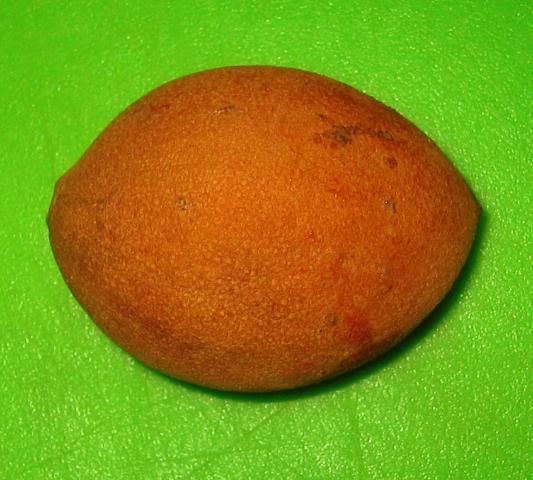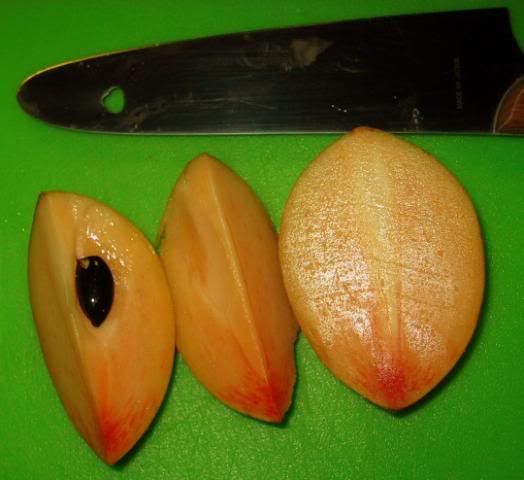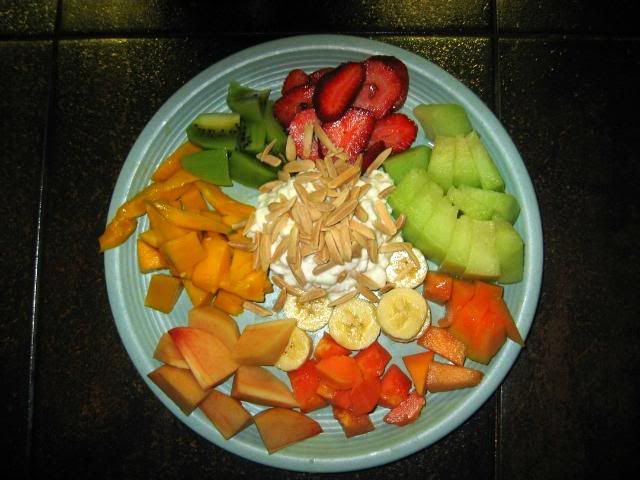| Pages:
1
2 |
BMG
Super Nomad
   
Posts: 1776
Registered: 6-10-2007
Location: La Paz / Bahia Asunci�n / Away from home
Member Is Offline
|
|
Chico Zapote
Found a very interesting fruit the other day while shopping at CCC. They had a small supply of a fruit the produce man called Chico Zapote. We had
never seen or heard of it before.
He offered to cut one open for us. It was absolutely delicious. Kind of 'pear like' in flavor with a soft consistency like a melon. He warned us that
you have to let them ripen well before eating so you want them soft to the touch.
Hopefully we'll find them again but for now they've sold out.

One large seed that looks like a giant watermelon seed. For reference, the knife blade is about 10".

Breakfast this morning.

I think the world is run by C- students.
|
|
|
longlegsinlapaz
Super Nomad
   
Posts: 1685
Registered: 11-18-2005
Location: La Paz
Member Is Offline
|
|
What time is breakfast served at your casa???
|
|
|
Paulina
Ultra Nomad
    
Posts: 3812
Registered: 8-31-2002
Location: BCN
Member Is Offline
|
|
It looks mango-ish.
Waiting for the answer to Longlegs' question....I'll even leave a tip and wash my own dish.
P<*)))>{
\"Well behaved women rarely make history.\" Laurel Thatcher Ulrich
|
|
|
longlegsinlapaz
Super Nomad
   
Posts: 1685
Registered: 11-18-2005
Location: La Paz
Member Is Offline
|
|
Naw.....if it tasted mango-ish, BMG woulda said so, he knows I'm one of those people for whom mango tastes like soap! Check your U2U, there may be
directions to breakfast there....or not!
|
|
|
BMG
Super Nomad
   
Posts: 1776
Registered: 6-10-2007
Location: La Paz / Bahia Asunci�n / Away from home
Member Is Offline
|
|
| Quote: | Originally posted by longlegsinlapaz
What time is breakfast served at your casa??? |
Anytime between 9AM and 1:30PM.
I thought it was cilantro that tasted like soap to some people.
Did I mention I put hot sauce on EVERYTHING?
As for washing your own dish, that's good. Have you ever tried washing dishes with a one-armed dish drier helping you?
I think the world is run by C- students.
|
|
|
longlegsinlapaz
Super Nomad
   
Posts: 1685
Registered: 11-18-2005
Location: La Paz
Member Is Offline
|
|
Cilantro TOO!
Not on MY plate , I thought I'd lurned ya that! , I thought I'd lurned ya that!
Anything like a one-armed paper hanger? 
Have you thought of washing AND drying until she gets her cast off? <<<Just a thought!
|
|
|
BMG
Super Nomad
   
Posts: 1776
Registered: 6-10-2007
Location: La Paz / Bahia Asunci�n / Away from home
Member Is Offline
|
|
| Quote: | Originally posted by longlegsinlapaz
Have you thought of washing AND drying until she gets her cast off? <<<Just a thought! |
I found that the dishes don't wash themselves but they do dry themselves.
Don't feel to sorry for Linguine. You saw this morning's breakfast. Here was tonight's dinner. (I heard her calling the doctor and asking if she could
keep the cast on another couple of months.)

I think the world is run by C- students.
|
|
|
Paulina
Ultra Nomad
    
Posts: 3812
Registered: 8-31-2002
Location: BCN
Member Is Offline
|
|
As Dern's cooking show girl friend in his dreams would say, "Yum - O!"
You guys sure eat well.
P<*)))>{
\"Well behaved women rarely make history.\" Laurel Thatcher Ulrich
|
|
|
Sharksbaja
Elite Nomad
     
Posts: 5814
Registered: 9-7-2004
Location: Newport, Mulege B.C.S.
Member Is Offline
|
|
Nice presentation as well! Is that a grilled shroom at the bottom?
DON\'T SQUINT! Give yer eyes a break!
Try holding down [control] key and toggle the [+ and -] keys
Viva Mulege!
Nomads\' Sunsets
|
|
|
BMG
Super Nomad
   
Posts: 1776
Registered: 6-10-2007
Location: La Paz / Bahia Asunci�n / Away from home
Member Is Offline
|
|
| Quote: | Originally posted by Sharksbaja
Nice presentation as well! Is that a grilled shroom at the bottom? |
Thanks. I did throw a couple mushrooms on the grill. My mistake. Should have put about 6 on.
Cabrito tonight.
A note on the chico zapote. I cut one open and it was really astringent. Researching the fruit a bit more, I found that the unripe fruit has a lot of
tannins in it. Unlike most fruit that just isn't very good or sweet until ripe, the chico zapote is terrible tasting and 'feels' funny in your mouth.
Lesson learned, do not eat until soft and fully ripe.
I think the world is run by C- students.
|
|
|
oxxo
Banned
Posts: 2347
Registered: 5-17-2006
Location: Wherever I am, I'm there
Member Is Offline
Mood: If I was feeling any better, I'd be twins!
|
|
| Quote: | | Originally posted by BMGThey had a small supply of a fruit the produce man called Chico Zapote. |
Back in SD we call them mountain oysters.
|
|
|
David K
Honored Nomad
        
Posts: 65455
Registered: 8-30-2002
Location: San Diego County
Member Is Offline
Mood: Have Baja Fever
|
|
Sapodilla ('Chico sapote')
Native to tropical America from southern Mexico to northern Brazil.
The sap from the tree is used to make chewing gum (chicle) and the fruit from the tree is similar to the popular sapote/ zapote in Mexico.
Sapodilla (Archras sapote) is from the Sapotaceae family of some 600 species... some of which bear edible fruit.
Here is more:
SAPODILLA
Manilkara zapota L.
Sapotaceae
Common Names: Sapodilla, Chico, Chico sapote, Zapote chico, Zapotillo, Chicle, Sapodilla plum, Naseberry.
Distant Affinity: Star Apple (Chrysophyllum cainito), Abiu (Pouteria caimito), Canistel (P. campechiana), Lucmo (P. lucuma), Sapote (P. sapota), Green
Sapote (P. viridis).
Origin: The sapodilla is believed to be native to Yucatan and possibly other nearby parts of southern Mexico, as well as northern Belize and
northeastern Guatemala. It was introduced long ago throughout tropical America and the West Indies and the southern part of the Florida mainland.
Adaptation: Sapodillas are not strictly tropical and mature trees can withstand temperatures of 26° to 28° F for several hours. Young trees are more
tender and can be killed by 30° F. The sapodilla seems equally at home in humid and relatively dry environments. Although it will grow in the milder
parts of southern California, whether it will fruit regularly remains to be seen. A tree in La Mesa, Calif. has borne fruit. Cool California nights
seem to be a limiting factor. The slow-growing sapodilla makes a satisfactory container or greenhouse specimen.
DESCRIPTION
Growth Habit: The sapodilla is an attractive upright, slow-growing, long-lived evergreen tree. Distinctly pyramidal when young, with age the tree may
develops a crown that is dense and rounded or sometimes open and somewhat irregular in shape. It is strong and wind-resistant and rich in a white,
gummy latex. In the tropics it can grow to 100 feet, but grafted cultivars are substantially shorter. A 40-year old tree in La Mesa, California is
only about 12 feet tall.
Leaves: The leaves are highly ornamental, 3 to 4-1/2 inches long and 1 to 1-1/2 inches wide. They are medium green, glossy, alternate and spirally
clustered at the tip of forked twigs.
Flowers: Sapodilla flowers are small, inconspicuous and bell-like, approximately 3/8 inch in diameter. They are borne on slender stalks in the axil of
the leaves. There are several flushes of flowers throughout the year.
Fruit: The fruit is round to egg-shape, 2 - 4 inches in diameter. The skin is brown and scruffy when ripe. The flesh varies from yellow to shades of
brown and sometimes reddish-brown, and may be smooth or of a granular texture. The flavor is sweet and pleasant, ranging from a pear flavor to crunchy
brown sugar. Fruits can be seedless, but usually have from 3 to 12 hard, black, shiny, flattened seeds about 3/4 inch long in the center of the fruit.
CULTURE
Location: The sapodilla prefers a sunny, warm, preferably frost free location. They are highly wind tolerant and can take salt spray.
Soil: Sapodillas are well adapted to many types of soil. It thrives in very poor soils but flourishes also in deep, loose, organic soil, as well as
light clay, sand or lateritic gravel. Good drainage is essential, the tree doing poorly in low, wet locations. It is highly drought resistant and
approaches the date palm in its tolerance of soil salinity.
Irrigation: The tree tolerates dry conditions remarkably well. Most mature sapodilla trees receive no watering, but irrigation in dry season will
increase productivity.
Fertilization: Newly planted trees need small and frequent feedings to become established. Fertilizers that contain 6-8% nitrogen, 2-4% available
phosphoric acid and 6-8% potash give satisfactory results. First year applications should be made every two to three months beginning with 1/4 pound
and gradually increasing to one pound. Thereafter, two to three applications per year are sufficient, in amounts proportionate to the increasing size
of the tree.
Pruning: Sapodillas require very little pruning.
Frost Protection: Although mature sapodilla trees will take several degrees of frost, it is prudent to provide them with overhead protection if
possible and plant them on the south side of a wall or building. Plants can also be covered with sheeting and such when significant frost is likely.
Propagation: The sapodilla is most commonly propagated by seed, which remain viable for many years if kept dry. Easily germinated, they take five to
eight years to bear. Since seed may not come true, vegetative propagation is desirable. Veneer grafting with seedlings as rootstock is the best method
. Air layering and rooting of cuttings have not been successful.
Pests and Diseases: In general the sapodilla tree remains quite healthy with little or no care. Insects and diseases usually don't cause sufficient
damage to necessitate control measures, although the Wooly White Fly can sometimes be a problem. Oil sprays in winter are suggested.
Harvest: It is often difficult to tell when a sapodilla is ready to pick. If the skin is brown and the fruit separates from the stem easily without
leaking of the latex, it is fully mature but must be kept at room temperature for few days to soften. It is best to wash off the sandy scruff before
putting the fruit aside to ripen. It should be eaten when firm-soft, now mushy. Firm-ripe sapodillas may be kept for several days in good condition in
the home refrigerator. At 35° F they can be kept for 6 weeks. Fully ripe fruits frozen at 32° F keep perfectly for a month. The fruit is mainly
consumed fresh.
Miscellaneous: Chicle, the latex obtained from the bark of the tree has been used as a chewing gum base for many years.
CULTIVARS
The extensive cultivation in India has resulted in numerous cultivars in that country. Quite a few cultivars are under test in Florida. A few of the
better known ones are listed below.
Brown Sugar
Originated in Homestead FL. Introduced in 1948. Fruit medium small, 2 to 2-1/2 inches long, nearly round. Skin light, scruffy brown. Flesh pale brown,
fragrant, juicy, very sweet and rich, texture slightly granular. Quality very good. Tree tall, bushy.
Prolific
Originated in Homestead, FL. Introduced in 1951. Round-conical fruit, 2-1/2 to 3-1/2 inches long and broad. Skin scruffy, brown, becoming nearly
smooth at maturity. Flesh light pinkish-tan, mildly fragrant, texture smooth, flavor sweet, quality good. Tree bears early, consistently and heavily.
Russel
Originated in Islamorade, FL. Introduced in 1935. Large, roundish fruit, 3 to 5 inches in diameter and length. Skin scruffy brown with gray patches.
Flesh pinkish-tan, shading to greenish-tan under the skin, mildly fragrant, texture somewhat granular. Flavor rich and sweet. Tree slower to bear and
less productive than Prolific.
Tikal
A new seedling selection with excellent flavor. Elliptic shape, light brown in color, smaller than Prolific. Ripens very early.
[Edited on 3-2-2009 by David K]
|
|
|
David K
Honored Nomad
        
Posts: 65455
Registered: 8-30-2002
Location: San Diego County
Member Is Offline
Mood: Have Baja Fever
|
|
BMG... is that enough info for you?
I can dig up more...
I was a member of the California Rare Fruit Growers back in the 80's...
|
|
|
dtbushpilot
Ultra Nomad
    
Posts: 3296
Registered: 1-11-2007
Location: Buena Vista BCS
Member Is Offline
Mood: Tranquilo
|
|
Please DK, tell us more   ....dt ....dt
"Life is tough".....It's even tougher if you're stupid.....
|
|
|
BMG
Super Nomad
   
Posts: 1776
Registered: 6-10-2007
Location: La Paz / Bahia Asunci�n / Away from home
Member Is Offline
|
|
| Quote: | Originally posted by David K
BMG... is that enough info for you?
I can dig up more...
I was a member of the California Rare Fruit Growers back in the 80's... |
I saw that website when I was researching the chico zapote. Sounds like quite a few varieties.
Now I've moved on to durian.
I think the world is run by C- students.
|
|
|
David K
Honored Nomad
        
Posts: 65455
Registered: 8-30-2002
Location: San Diego County
Member Is Offline
Mood: Have Baja Fever
|
|
| Quote: | Originally posted by dtbushpilot
Please DK, tell us more   ....dt ....dt |
Oh goodie...   
|
|
|
David K
Honored Nomad
        
Posts: 65455
Registered: 8-30-2002
Location: San Diego County
Member Is Offline
Mood: Have Baja Fever
|
|
| Quote: | Originally posted by BMG
| Quote: | Originally posted by David K
BMG... is that enough info for you?
I can dig up more...
I was a member of the California Rare Fruit Growers back in the 80's... |
I saw that website when I was researching the chico zapote. Sounds like quite a few varieties.
Now I've moved on to durian. |
Oh, that's a good one!
They say that you don't want to be in a taxi with a talking driver in Thailand or Malaysia during durian season!
The smell of this highly esteemed jungle fruit can be a cross between kerosene and raw sewage... If you can get some of this fruit past your nose, the
taste is supposed to be the finest in the world!  
|
|
|
lingililingili
Nomad
 
Posts: 449
Registered: 2-24-2008
Location: La Paz, Bahia Asuncion
Member Is Offline
|
|
David: No way, I've tasted durian and it's crap! Excuse me, not very tasty.
Life is just one damned thing after another
|
|
|
David K
Honored Nomad
        
Posts: 65455
Registered: 8-30-2002
Location: San Diego County
Member Is Offline
Mood: Have Baja Fever
|
|
| Quote: | Originally posted by lingililingili
David: No way, I've tasted durian and it's crap! Excuse me, not very tasty. |
Yah, I wondered how something than can smell so bad get to be rated up there with mangos! Maybe you got a bad one? Perhaps it's an aquired taste?
|
|
|
BMG
Super Nomad
   
Posts: 1776
Registered: 6-10-2007
Location: La Paz / Bahia Asunci�n / Away from home
Member Is Offline
|
|
| Quote: | Originally posted by David K
The smell of this highly esteemed jungle fruit can be a cross between kerosene and raw sewage... If you can get some of this fruit past your nose, the
taste is supposed to be the finest in the world!   |
I found that it tastes exactly like it smells.
I've tried it a few different ways, even a durian popsicle.
Question: who was the first idiot that said. "Smells awful. Wonder what it tastes like?"
I think the world is run by C- students.
|
|
|
| Pages:
1
2 |

